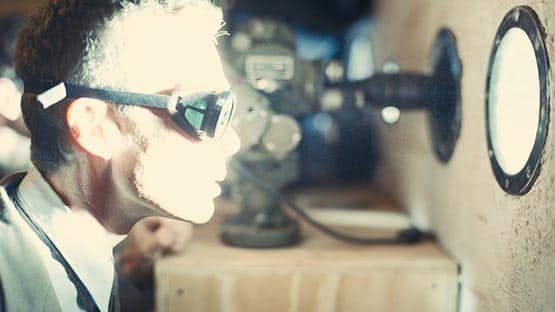
“Oppenheimer,” the biopic about the father of the atomic bomb, J. Robert Oppenheimer, exceeded expectations on its opening weekend bringing in an estimated $80.5 million.
Virginia Tech’s Kevin Pitts has studied Oppenheimer’s life, Los Alamos and the Manhattan Project.
J. Robert Oppenheimer was the science director of the Manhattan Project during World War II.
Pitts, a physicist, weighed in on the science and history and how it was portrayed in the film.
“I was particularly struck by how (Christopher) Nolan portrayed the Trinity test, which was the first detonation of an atomic bomb in July 1945. You see the flash of light and associated explosion, but the only sound you hear is someone, presumably Oppenheimer, breathing.
“The audience might first think this is an ‘artistic choice’ by the director to suppress the sound of the explosion and focus on the nervous breathing of an individual. But, in fact, it was technically very accurate.”
Pitts said the observation locations were about six miles from the blast site.
“While the light from the explosion would have been visible immediately, it would have taken about 30 seconds for any sound, and the associated shock wave, to arrive,” he said.
He also though the portrayal of Oppenheimer, portrayed in the film by Cillian Murphy, was “very accurately portrayed.”
“I appreciate very much that the first part of the film focuses on the truly revolutionary period of physics in the 1920s and 1930s that arose from our new understandings of special relativity, general relativity, and – most important to the bomb project – quantum mechanics.”
Pitts said he felt the film did a good job capturing a complicated man.
“I was impressed at how well the film got at Oppenheimer as a deep thinker, a renaissance man, and someone who evolved over time. He was a complicated and fascinating man, which this film did a nice job of conveying,” Pitts said.
Pitts is the dean of the Virginia Tech College of Science and a faculty member with the Department of Physics. Previously, he was chief research officer at Fermilab National Accelerator Laboratory and a professor of physics at the University of Illinois at Urbana-Champaign. While at Fermilab, he oversaw the laboratory’s science program and worked extensively on a number of particle accelerator-based projects, including the deep underground neutrino experiment.










